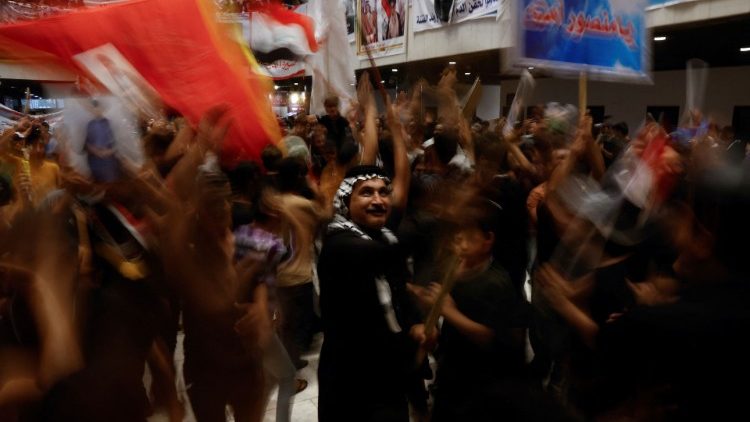By Lisa Zengarini
As tensions continue to mount in Iraq over the failure to form a government after nearly ten months of post-election deadlock, Cardinal Louis Raphael Sako of Baghdad has joined outgoing Prime Minister Mustafa al-Kadhimi and other Iraqi leaders in calling for a national dialogue.
The head of the Chaldean Church has warned that the country is on the brink of what he called a “tsunami”.
Rival demonstrations in Baghdad
Iraq has been without a new elected government since the election on 10 October 2021, which were won by the Sadrist Movement led by the powerful Shiite cleric Muqtada al-Sadr.
Unrest has been running high since the populist leader withdrew all his lawmakers from parliament following his failed attempt to form a government that excluded the rival Shiite Coordination Framework, which gathers parties and militias mostly aligned with Iran.
Since then al-Sadr has exerted political pressure through his supporters preventing his rivals, including former Prime Minister Nouri al-Maliki, from forming an alternative government.
Tensions soared last week when thousands of al-Sadr’s followers stormed Baghdad’s fortified Green Zone, which houses government buildings and foreign missions, and took over the parliament building in response to attempts by his Shiite rivals to form a government with premiership candidates he opposed. Pro-Iranian Shiite groups organized counter-demonstrations nearby.
On Wednesday, in a televised address from Najaf, al-Sadr called on his supporters to continue their sit-in inside the parliament until his demands, which include dissolution of parliament and early elections, are met.
Sako: the situation is frightening
As the confrontation continues, Patriarch Sako has urged all political parties to establish a “national consultation table”, warning that the ongoing political deadlock will have dire consequences for everybody.
In an appeal released from his summer residence in Ankawa, a suburb of Erbil, the Patriarch remarked that the situation is “white-hot” and “frightening”, and that “no more delays can be tolerated”.
“Political leaders, and also religious authorities, must remedy the situation, before a Tsunami sweeps us all away,” he said.
Failure of the quota system
Cardinal Sako further pointed to the urgent need to remove the root structural causes of the continuing chaos in the country and, above all, to recognize the failure of the political system established in 2003, after the United States-led invasion that toppled Saddam Hussei, by which power is distributed on an ethnic-sectarian basis.
The quota system requires the Head of State to be chosen from among Kurdish political representatives, while the President of Parliament must be a Sunni and the Premier must be Shiite.
It is blamed by many Iraqis for the endemic corruption and dysfunction that has prevented any meaningful progress for years, despite Iraq’s oil wealth and relative peace after the defeat of the ISIL terrorist group in 2017.
The sectarian approach has produced injustice and corruption
The sectarian approach and the quota system – said the Chaldean Patriarch – have produced “corruption and injustice”.
According to Cardinal Sako, it is therefore necessary to find “new approaches and new ways” to design an efficient political system, in which institutions are placed at the service of the people, and not of partisan interests.
Listen to our report
vaticannews.va






